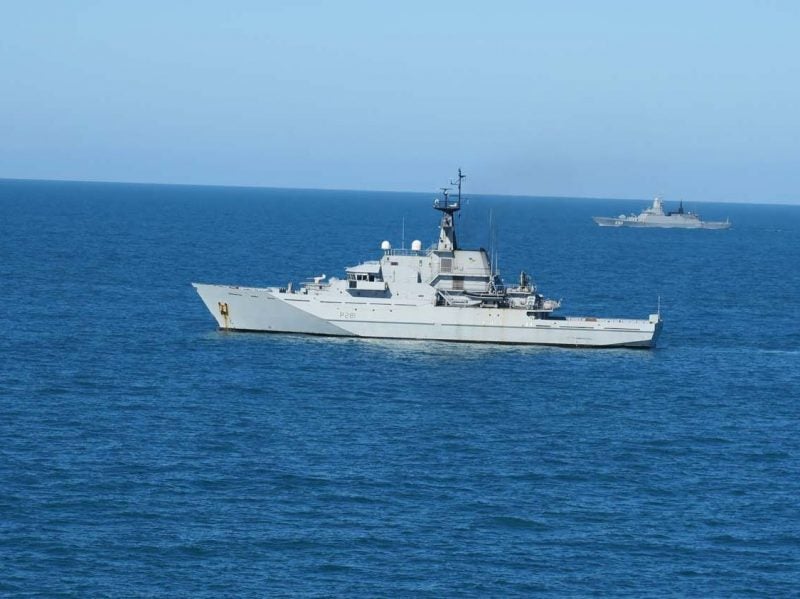
The Royal Navy has shadowed a number of Russian warships as they transit the North Sea and the English Channel after reporting ‘unusually high’ levels of Russian activity in the area.
The uptick in activity comes as the UK Government is focused on responding to the Covid-19 coronavirus pandemic, and as the Royal Navy assists in the government’s response.
Nine vessels from the Royal Navy, with the support of NATO allies, shadowed seven Russian warships as they travelled through the North Sea and the English Channel over the past week.
The Royal Navy dispatched Type 23 frigates HMS Kent, HMS Sutherland, HMS Argyll and HMS Richmond, Offshore Patrol Vessels HMS Tyne and HMS Mersey, RFA Tideforce, RFA Tidespring, and survey vessel HMS Echo. The vessels were supported by Merlin and Wildcat helicopters from 814 and 815 Naval Air Squadrons.
HMS Tyne’s Executive Officer Lieutenant Nick Ward said: “As the armed forces are helping the NHS save lives in the UK, it’s essential the navy continues to deliver the tasks we have always performed to help keep Britain safe.
“This is very much part of routine business for HMS Tyne and represents one of the many roles our patrol vessels perform in support of the Royal Navy’s commitments.”
The Russian Ships shadowed by the Royal Navy were three Steregushchiy-class corvettes, two Ropucha-class landing ships and two Admiral Grigorovich-class frigates accompanied by tug and support vessels.
Some UK politicians expressed concern to Naval Technology that foreign powers could seek to exploit the Covid-19 pandemic.
MP and Chair of the Defence Committee Tobias Ellwood said: “These unusually high levels of activity in the English Channel and the North Sea demonstrate exactly why the UK must not neglect the real danger of foreign powers exploiting the coronavirus crisis for their own ends. The government must remain vigilant to all threats to our security, not just the imminent danger that this outbreak poses.
Taking our eye off the ball can have dire consequences. The Ministry of Defence must continue to horizon-scan and keep the nation safe so that we are not blindsided by future threats. Preparedness and expecting the unexpected are more important than ever.”
This concern was echoed by committee member MP Martin Docherty-Hughes who said that the uptick in activity showed that Russia could be looking to take advantage of the pandemic.
Docherty-Hughes said: “This is yet another reminder that there is no such thing as a bad crisis for the Putin regime which will seek any sort of leverage, whether it be maritime operations in the North Sea or influence operations in Northern Italy, to seek to undermine liberal democracies and distract from the increasing crisis his own country’s underfunded healthcare system is under because of the virus.
“At a time when states and peoples in Europe should be coming together, my thoughts go out to ordinary Russian people whose government deems this sort of activity to be worthy of wasting time and resources on — though I am glad that the Royal Navy has been able to respond to these provocations.”
The vessels were also shadowed by sailors from Standing NATO Maritime Group One (SNMG1) which flagship vessels consist of HNoMS Otto Sverdrup, HDMS Absalon, HMS Sutherland and FGS Rhoen.
Commander of SNMG1 Royal Norwegian Navy Commodore Yngve Skoglund said: “Being one of the busiest seaways in the world, with approximately 500 ships per day transiting, free access and entry to the Channel is crucial for NATO.
“There has been a substantial non-allied military activity in the area lately. Our job as a NATO force, together with our Allies, is to deliver NATO’s ‘deter and defend’ message and provide maritime security.”
The Russian vessels were shadowed for a week by HMS Tyne as they passed through the English Channel and the south coast of the UK.
Other ships including HMS Sutherland joined the shadowing effort on their return from Exercise Cold Response in Norway. SNMG1 maintains a high readiness task-force of frigates and destroyers to patrol the waters of northern Europe.
Skoglund added: “Our presence in the English Channel for the past few weeks is exactly what the standing maritime forces are made for. Every day we train and prepare to be ready for whatever task is given to us from NATO Maritime Command.
“It was a great pleasure for us to be able to support our British and French Allies in the Channel, and a great opportunity to test our forces’ ability to react swiftly to an upcoming task. We are here to sustain NATO’s essential work even when all nations are facing tough times.”



